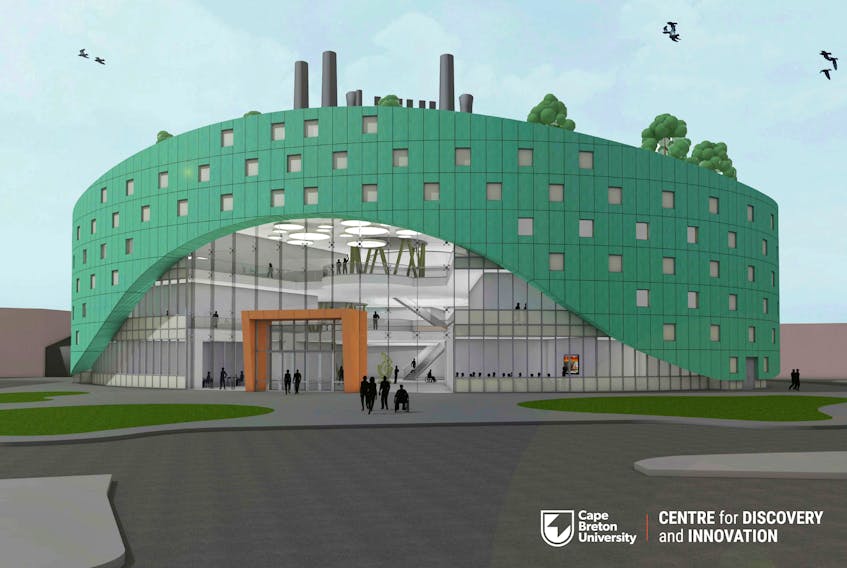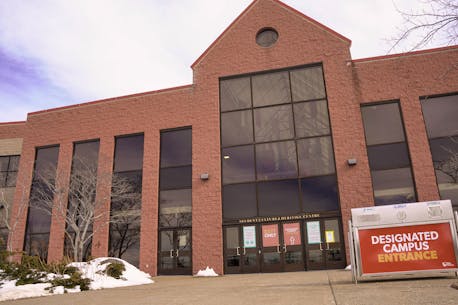SYDNEY, N.S. — More than half of the $105 million in provincial funding going to rural universities in Nova Scotia is being allocated to Cape Breton University.
A total of $54 million is being given to the university. Of this, $14 million is for repairs or upgrades in mechanical or electrical systems, $5 million for health-care training strategies and $35 million for the new Centre for Discovery and Innovation.
Brian Wong, minister of Advanced Education, and Brian Comer, MLA for Cape Breton East, were at CBU Monday for the announcement.
CBU President David Dingwall thanked Wong, Comer and Premier Tim Houston and his staff for the funding, which moves them to the design phase for the Centre for Discovery build.
"No student, domestic or international, should have to work in laboratories or classrooms that their grandparents and parents once used," said Dingwall to applause from the crowd of about 80 people at the announcement.

Centre for Discovery
As reported in the Cape Breton Post, the Centre for Discovery and Innovation is an $80 million project that will be a new build on campus.
Announced in October 2020, the building will be between the Shannon School of Business and the Verschuren Centre. Planning for the Centre for Discovery started more than a year before it was announced.
The current plan is for the space to be 80,000 square feet with state-of-the-art equipment and technology, which is expected to attract researchers and students from around the globe.
"We have met a monumental milestone in our journey to modernize and revitalize our campus," Dingwall told the crowd.
"But our journey is not over yet. We will continue to leverage other parties for additional funds."
Along with updated equipment and green technology, Dingwall said even the lab structure will be modernized.
"In the past, labs were assigned to a professor," he explained. "These labs will be collaborative labs so many, many people will have utilization of these facilities until seven in the morning until 10 o'clock at night."

Marshall Institute
The new Centre for Discovery and Innovation will also include the Marshall Institute. Named after Donald Marshall Jr., who was an advocate for Indigenous fishing rights, the focus will be on health, environmental justice and climate change from an Indigenous perspective. Naming the institute after Marshall was brought to his family by Stephen Augustine, hereditary chief on the Mi'kmaq council, who was announced as the executive director of the Marshall Institute in February.
Laurianne Sylvester, dean of the Unama'ki College, is Marshall's niece and the one who keeps the family updated on the progress of the Marshall Institute.
"It's a good idea to honour Junior in some way, in a positive way for what he's contributed to our Mi'kmaq nation," Sylvester said.
Leadership is one of the ways he contributed and Sylvester said it's important the Marshall Institute has this, along with health and climate change, as part of its core elements.
Sylvester remembers attending the youth camps Marshall started hosting almost immediately after being released from jail where he spent 11 years and one month incarcerated for a crime he didn't commit.
"Junior looked out for the youth and wanted to provide for the youth, give them something to look forward to, get them off of the streets," she said. "Junior was a real community leader."

Deferred Maintenance
Wong announced a total of $65 million was being distributed among four universities in Nova Scotia.
Both he and Dingwall said infrastructure needs are a problem at universities throughout Nova Scotia and out of province.
"For us at CBU, it means the completion of design work, fixing building components that are at the end of their life cycle. This includes fixing leaky roofs, drafty windows, malfunctioning electrical components and much more," Dingwall said.
CBU is receiving $14 million, while St. Francis Xavier University is getting $23.4 million. Acadia is receiving $22 million and Université Sainte-Anne will get $5.6 million.
When asked if any of the universities will be using the funding for air ventilation upgrades, Wong said they could if they chose to and it is their decision to use the money where they deem most needed.
- Nicole Sullivan is a multimedia journalist with the Cape Breton Post. Follow her on Twitter @CBPostNSullivan.











